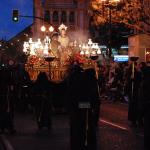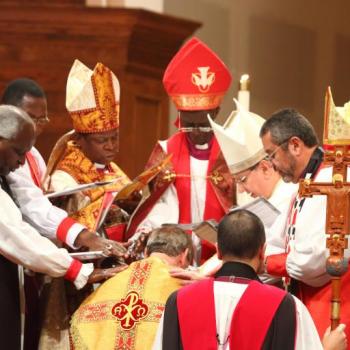The release of a new book (by me) on the value of the Protestant Reformation may look well timed given the current spate of scandals (once again) in the Roman Catholic Church. Some Protestants are watching the laments about scandalous priest (and cardinals) and the efforts of bishops to cover up those sins and wondering what church history course these complainants took as undergrads. The Roman Catholic Church has a long history of bishops who abused their power. This was part of the complaint that Protestants (Martin Luther) and humanists (like Erasmus) made in the sixteenth century. To be sure, the Council of Trent succeeded with some reforms. But by 2018 people should be well aware of the problems inherent with authority that has no checks and balances. Imagine a President like Donald Trump who needed to reform the office of presidency. Would he do it? How well would he do it? Now, imagine ecclesiastical monarchs and princes who are supposed to reform themselves. With God all things are possible, but vested interests also die hard.
Which is why church government and civil government matter. If one of the lessons of 1789 is the danger of divine-right monarch for secular politics, why is divine-right church hierarchy any less of a problem? Some Roman Catholics will say, “because the Bible says so.” Well, to interpret Matt. 16:18 — ” I tell you, you are Peter, and on this rock I will build my church, and the gates of hell shall not prevail against it” — as the warrant for Vatican City, papal supremacy, and episcopacy is almost as simplistic as the anti-Catholicism of Jack Chick comics.
All of this is a way of going back to Rusty Reno’s explanation for his conversion from Anglicanism to Roman Catholicism. He is the editor of First Things and over a decade ago laid out his reasons for becoming Roman Catholic. On one level, it was the liberalism and moral corruption of the Anglican communion that drove his decision:
At various points after the election and consecration of Gene Robinson (a man who divorced his wife to live with his male lover) as bishop of New Hampshire, I found that my real ability to be loyal to the Episcopal Church slowly evaporated. The indifference to apostolic tradition and constraint overwhelmed me. I may have wanted to return to the ruins of the Church with Nehemiah’s devotion, but in reality I was thinking bitter thoughts as I sat in my pew. The most innocuous little divergences from the Prayer Book made me angry. The sermons of my quite faithful rector were subjected to an uncharitable scrutiny. I made caricatures of church leaders and engaged them in tiresome imaginary debates. The good people of my parish lost their individuality and were absorbed into my mental picture of “Episcopalians,” people to whom I would be heroically but lovelessly loyal.
After the Theodore McCarrick resignation and the findings of the Pennsylvania Grand Jury, it seems fair to wonder if Reno is having similar imaginary debates.
But the moral failings of Anglican bishops was not Reno’s bottom line. The idea that really convinced him was that Rome had what no other church does — reality over theory:
The Catholic Church did not deliver me from apostasy and false teaching. I teach at a Jesuit University, so I am not naïve about just how insouciant about orthodoxy priests can be. Nor did Catholicism provide me with a neat, efficient, and trouble-free church. I do read newspapers. What my reception into the Catholic Church provided was deliverance from the temptation to navigate by the compass of a theory. The Catholic Church has countless failures, but of this I am certain: Catholic Christianity does not need to be underwritten by an idea.
. . . The ocean needs no justification. It needs no theory to support the movement of its tides. In the end, as an Episcopalian I needed a theory to stay put, and I came to realize that a theory is a thin thread easily broken. The Catholic Church needs no theories. She is the mother of theologies; she does not need to be propped up by theologies. As Newman put it in one of his Anglican essays, “the Church of Rome preoccupies the ground.” She is a given, a primary substance within the economy of denominationalism. One could rightly say that I became a Catholic by default, and that possibility is the simple gift I received from the Catholic Church. Mater ecclesia, she needed neither reasons, nor theories, nor ideas from me.
It sure looks right now that such Roman Catholic exceptionalism (the Christian form of American greatness) will not do. Lots of hurting church members, even more — victims of abuse, need a theory. Does Reno have one? Is this it?
. . . the episcopal establishment has been failing for a long time, and in many phases. It failed to secure the theological loyalty of Catholic colleges and universities. No diocese has systematically implemented the reforms of the liturgy encouraged by Pope Benedict. The American episcopacy oversees parochial school systems in decline, and sponsors social justice ministries run by people who reject the Church’s teaching on many moral matters. In recent decades, the bishops’ conference has made feeble efforts to recover the electoral influence it had when archbishops and cardinals were part of the Democratic party’s urban machines.
Despair says, “Nothing will change.” But that is false. Many of us have long known that we cannot trust Catholic schools run by the established system to teach our kids to be Catholic. Our response has been to found lay-run schools. The Neo-Catechumenate Way, Opus Dei, Communion and Liberation—like the religious orders founded in earlier centuries, these movements seek to do what the chancery-dominated, establishment Church can’t.
These movements are not anti-clerical. They don’t reject the bishops. But they don’t wait around for the episcopal establishment, which is so often unable to meet the challenges of our time.
The McCarrick revelations and the Pennsylvania Grand Jury Report are part of a larger trend: The episcopal establishment has been ineffective for decades. This does not mean that we have no good and holy bishops. But the system is clotted and mediocre, bringing out the worst in our leaders rather than their best.
There is no cause for despair. What we need is determination—and a bit of creative destruction, undertaken with cheerful boldness. FOCUS, Lumen Christi, and other initiatives have been launched in recent years, none out of diocesan offices.
Collectively, the American bishops lack moral and spiritual authority. That does not make them irrelevant. They will need to get their act together and address their obvious failures. But the sources of renewal will come from elsewhere, from determined, energetic, and faithful men and women who don’t wait around for bishops to act. That’s how the gospel has been well served so often in the past.
Wouldn’t that same argument have worked back in 2005 for remaining an Anglican? The church is on the ropes but renewal will come from other sources. A 21st-century John Wesley will emerge and bring a desire for holiness back to the people and maybe even the priests.
The answer may be that Rome is different. It needs no justification. Right now — but also going back to Martin Luther — that looks like a recipe for an episcopate to police themselves.















